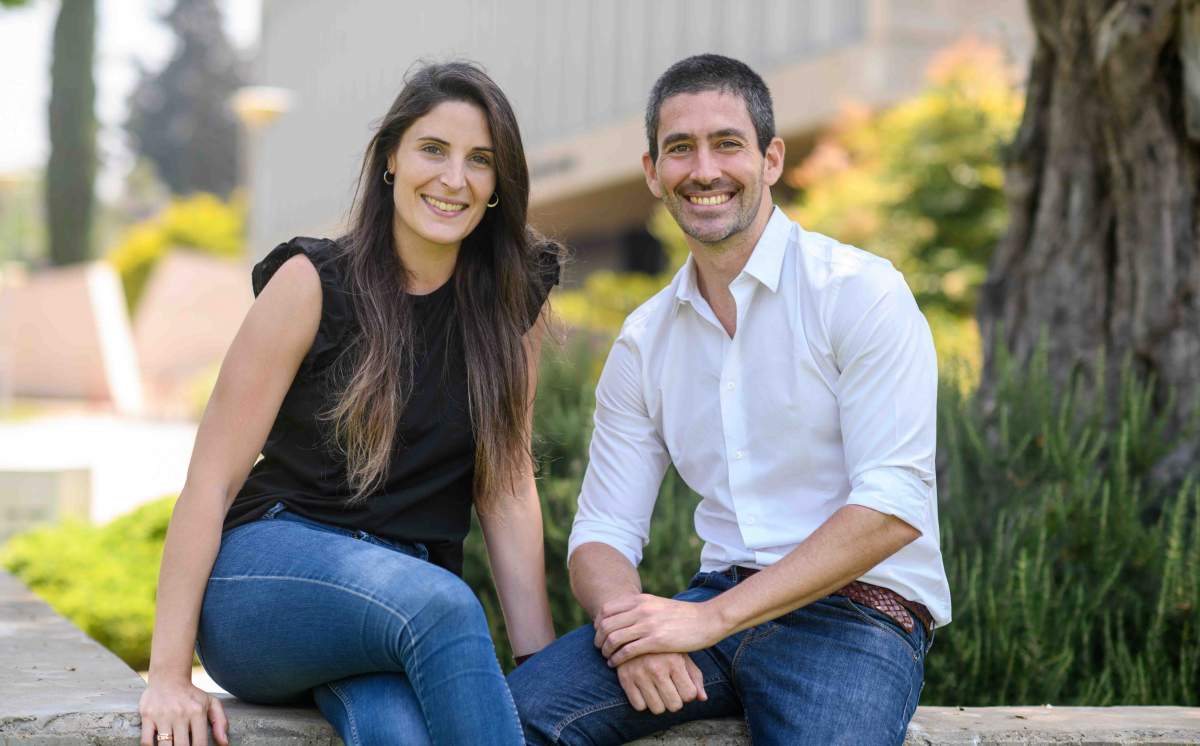Are you a journalist? Please sign up here for our press releases
Subscribe to our monthly newsletter:

Dr. Javier María Peralta Ramos and Dr. Denise Kviatcovsky were determined to find postdoctoral positions in the same place after conducting a long-distance romance in Argentina. Peralta Ramos received his PhD from the National University of Córdoba, where his research focused on the way that inflammation affects the immune response of the brain. This area has vital implications for understanding and treating Alzheimer’s disease, and it led him to the research of one of the leaders in the field: the Weizmann Institute of Science’s Prof. Michal Schwartz. After hearing Schwartz’s lecture at an international conference in Greece, Schwartz’s lab in the Institute’s Neurobiology Department was at the top of his list. “At the end of a Skype conversation, she told me I was accepted. I called Denise right away, and we immediately decided to find her a position at the Weizmann Institute as well.”
Kviatcovsky was living at the time in Buenos Aires – 800 km away from Peralta Ramos in Córdoba. She was also on the brink of finishing her doctoral research in immunology at the National University of La Plata. Her subject: How differences in the genetic makeup of tuberculosis bacteria affect the immune response of the cells lining the airways. Denise and Javier had met at an immunology conference and they fell in love and stayed in love, despite the physical distance. So Peralta Ramos would not come to Israel without her.
Denise: “In looking for a lab, I came upon the group of Prof. Eran Elinav, in the Institute’s Immunology Department. I had not researched the human microbiome before, so I was intrigued; I knew microbiome research was a hot topic that touches on numerous other subjects, and I realized Elinav’s was one of the top labs in the field. Once he offered me the postdoctoral position, I moved to Córdoba to be with Javier while we both finished writing our theses.” Javier: “Together, we discovered all the things we have in common: A love of science and our interest in the immune system; our mutual respect for each other’s opinion, especially when it comes to asking for advice on writing. I even showed Denise my first email to Michal Schwartz for her comments before sending it.”
We are the only postdocs from Argentina, but we are part of an interesting cohort of postdocs from all over the world
Denise: “Although the microbiome research was new to me, my immunology experience helped me get up to speed in the lab. My work is challenging and fascinating: I’m working on the role of the microbiome in health and disease. Javier is continuing his previous research in the field of neuroimmunology, specifically investigating the role of the immune system in Alzheimer’s.
“Our families and friends were disconcerted at our choice of Israel. But here at the Institute, all of our needs have been attended to. We came with just a few suitcases. I really appreciate that our apartment was furnished in a new building next to the Institute.” Javier: “Many of our friends from Argentina ended up in places all over the world, but few of them received such warm support. We acclimated quickly, and made new friends everywhere – in the lab, the gym, etc. We are the only postdocs from Argentina, but we are part of an interesting cohort of postdocs from all over the world – India, China, Italy, other South American countries, and more -- and of course we have become close to the Israelis in our labs. We are finding that people here are direct, but they listen to new ideas and encourage us to advance.”
“The openness and warmth of Israelis is what we are used to in South America. We haven’t felt out of place for a moment. We are even managing to communicate in Hebrew,” adds Javier. “The campus is beautiful; it is just a wonderful bubble devoted to aesthetics and science, so that we don’t mind working the long hours our research often requires. We do like to take breaks and get to Tel Aviv, where we go to the ocean or wander around Jaffa. It’s only 25 minutes away by train – nothing like the distances we’re used to in Argentina.”
Prof. Eran Elinav's research is supported by the Leona M. and Harry B. Helmsley Charitable Trust; the Adelis Foundation; the Pearl Welinsky Merlo Scientific Progress Research Fund; the Else Kroener Fresenius Foundation; the Lawrence and Sandra Post Family Foundation; the Yael and Rami Ungar; the Daniel Morris Trust; the estate of Bernard Bishin for the WIS-Clalit Program; the Park Avenue Charitable Fund; the Hanna and Dr. Ludwik Wallach Cancer Research Fund; Donald and Susan Schwarz; the Howard and Nancy Marks Charitable Fund; the estate of Malka Moskowitz; the estate of Myron H. Ackerman; Aliza Moussaieff; and the European Research Council. Prof. Elinav is the Incumbent of the Sir Marc and Lady Tania Feldmann Professorial Chair.
Prof. Michal Schwartz's research is supported by the Sagol Institute for Longevity Research; the Thompson Family Foundation Alzheimer's Disease Research Fund; the Adelis Foundation; the Rowland and Sylvia Schaefer Family Foundation; and Carla Hunter and Andre M. Schub. Prof. Schwartz is the incumbent of the Maurice and Ilse Katz Professorial Chair of Neuroimmunology.